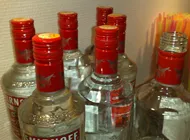Table of Contents
In a letter to Sigma Nu and Sigma Chi fraternities in late September, Nate Boswell, associate dean of residential education, urged the two fraternities to completely abstain from serving hard liquor at their upcoming parties. This request followed an increased university focus on high-risk drinking that arises from students abusing hard liquor.
The policy means that fraternities are only allowed to serve beer at all-campus parties and events. Ralph Castro, the director of the Office of Alcohol Policy and Education, said the university is “discouraging high-risk drinking, especially with hard liquor.”
In order to enforce the policy, the university expects students to self-regulate their drinking habits. “We are asking student staff to actively discourage high-risk drinking and engage students in conversations to prevent dangerous behaviors before they occur,” said Castro.
Hard alcohol is the number one reason students get sent to the hospital from campus. Last year set a record high number of hospitalizations, with sixty-four students sent to the emergency room for alcohol poisoning, up from sixty-one the previous year. Castro added, “Every ER transport last year was due to overconsumption of hard liquor.”
There is a big difference between drinking hard alcohol and beer, especially when it comes to volume of consumption. “It takes 8 times more beer (by 12 oz volume) to get the same amount of pure alcohol from hard liquor (1.5oz per volume),” Castro stated. “Most people would get full faster from consuming beer over hard liquor, thus reducing the amount of pure alcohol that is consumed by volume.”
Ultimately, Castro believes that, “if students consume less hard liquor, it will decrease dangerous drinking situations.”
The University has made other changes in its alcohol prevention efforts. The offices for alcohol policy and enforcement have merged in order to create a stronger force on campus.
Ralph Castro, previous Vaden Health Center associate director, has now been appointed the director in the newly formed Office of Alcohol Policy and Education. According to Castro, “We reviewed our alcohol policies and discovered that they were littered across campus in many different offices. We wanted to centralize and clarify the policy and make it more student focused.”
This year, the new office and policies are, according to Castro, “aimed at preventing and discouraging high-risk and reckless drinking.”
“It establishes a position that the University does not tolerate reckless drinking behaviors,” stated Castro. “We hope that by taking a clearer and consistent approach to addressing reckless and high-risk drinking, we can prevent some ER transports.”
Adrian Castillo, a senior and previous Wilbur dorm residential advisor (RA), commented on Stanford’s alcohol initiatives. “There certainly was alcohol present in the freshman dorm that I was an RA in and there were definitely instances where people drank too much.”
Castillo believes that the RA position is a very valuable part of Stanford’s alcohol related policies. He described RAs as “a key point of enforcement for Stanford’s alcohol policy as the RAs really are the ones responsible for keeping the students safe.”
Castillo’s advice to students is “to not be afraid to say something if you see someone who is very drunk drink some more.” There are many instances when, if someone steps in before the situation gets out of hand, an ER trip can be avoided.
Stanford hopes their new approaches will cause a decline in the number of ER transports. “This year we are calling on the entire campus to partner with us and prevent dangerous behaviors,” Castro stated.





